Mental Health Nursing Assignment on Therapeutic Relationships
VerifiedAdded on 2022/09/18
|6
|1462
|24
Homework Assignment
AI Summary
This assignment delves into the crucial role of therapeutic relationships in mental health nursing, particularly concerning patients with depression. The student's response addresses two key questions: how mental health nurses establish therapeutic alliances and why these relationships are essential. The assignment highlights the importance of self-awareness, self-knowledge, empathy, and boundary awareness for nurses. It explores the phases of developing therapeutic relationships, from pre-orientation to resolution, and emphasizes the significance of these relationships in treating depression. The assignment also discusses how depression affects individuals and their families, and how nurses can provide support and create a safe environment for patients. The student supports their arguments with references to relevant literature, demonstrating an understanding of the subject matter and academic conventions.
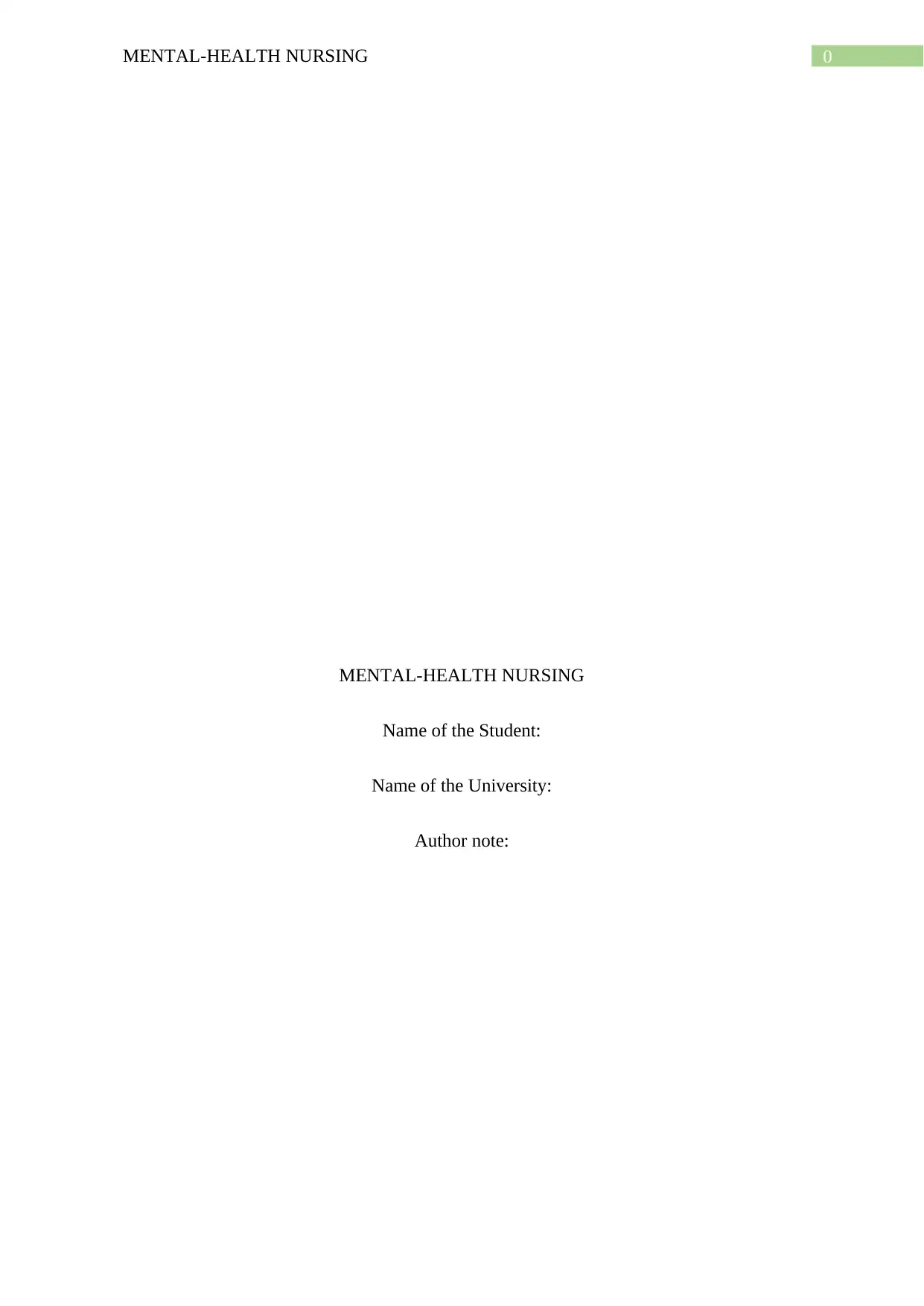
0MENTAL-HEALTH NURSING
MENTAL-HEALTH NURSING
Name of the Student:
Name of the University:
Author note:
MENTAL-HEALTH NURSING
Name of the Student:
Name of the University:
Author note:
Paraphrase This Document
Need a fresh take? Get an instant paraphrase of this document with our AI Paraphraser
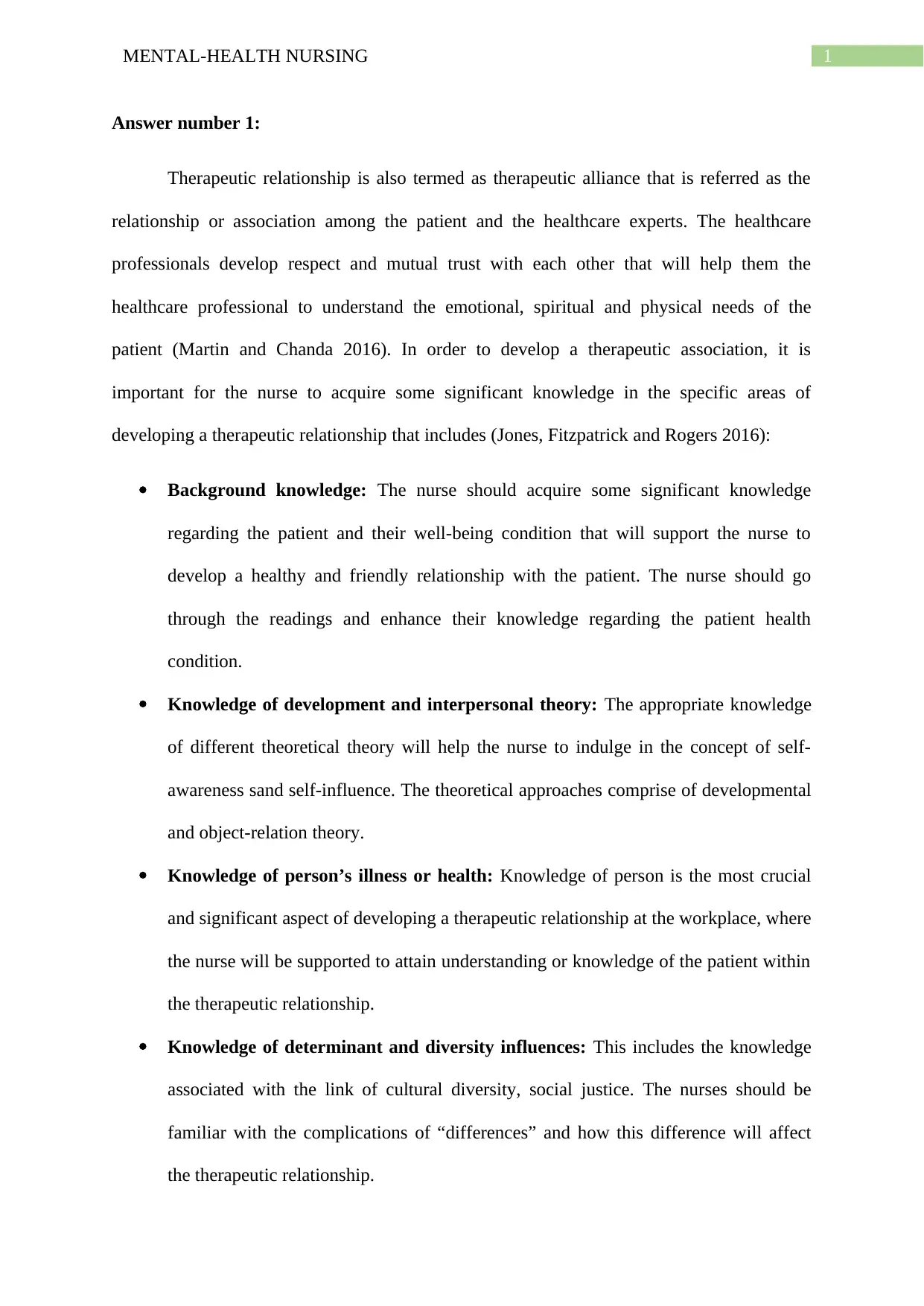
1MENTAL-HEALTH NURSING
Answer number 1:
Therapeutic relationship is also termed as therapeutic alliance that is referred as the
relationship or association among the patient and the healthcare experts. The healthcare
professionals develop respect and mutual trust with each other that will help them the
healthcare professional to understand the emotional, spiritual and physical needs of the
patient (Martin and Chanda 2016). In order to develop a therapeutic association, it is
important for the nurse to acquire some significant knowledge in the specific areas of
developing a therapeutic relationship that includes (Jones, Fitzpatrick and Rogers 2016):
Background knowledge: The nurse should acquire some significant knowledge
regarding the patient and their well-being condition that will support the nurse to
develop a healthy and friendly relationship with the patient. The nurse should go
through the readings and enhance their knowledge regarding the patient health
condition.
Knowledge of development and interpersonal theory: The appropriate knowledge
of different theoretical theory will help the nurse to indulge in the concept of self-
awareness sand self-influence. The theoretical approaches comprise of developmental
and object-relation theory.
Knowledge of person’s illness or health: Knowledge of person is the most crucial
and significant aspect of developing a therapeutic relationship at the workplace, where
the nurse will be supported to attain understanding or knowledge of the patient within
the therapeutic relationship.
Knowledge of determinant and diversity influences: This includes the knowledge
associated with the link of cultural diversity, social justice. The nurses should be
familiar with the complications of “differences” and how this difference will affect
the therapeutic relationship.
Answer number 1:
Therapeutic relationship is also termed as therapeutic alliance that is referred as the
relationship or association among the patient and the healthcare experts. The healthcare
professionals develop respect and mutual trust with each other that will help them the
healthcare professional to understand the emotional, spiritual and physical needs of the
patient (Martin and Chanda 2016). In order to develop a therapeutic association, it is
important for the nurse to acquire some significant knowledge in the specific areas of
developing a therapeutic relationship that includes (Jones, Fitzpatrick and Rogers 2016):
Background knowledge: The nurse should acquire some significant knowledge
regarding the patient and their well-being condition that will support the nurse to
develop a healthy and friendly relationship with the patient. The nurse should go
through the readings and enhance their knowledge regarding the patient health
condition.
Knowledge of development and interpersonal theory: The appropriate knowledge
of different theoretical theory will help the nurse to indulge in the concept of self-
awareness sand self-influence. The theoretical approaches comprise of developmental
and object-relation theory.
Knowledge of person’s illness or health: Knowledge of person is the most crucial
and significant aspect of developing a therapeutic relationship at the workplace, where
the nurse will be supported to attain understanding or knowledge of the patient within
the therapeutic relationship.
Knowledge of determinant and diversity influences: This includes the knowledge
associated with the link of cultural diversity, social justice. The nurses should be
familiar with the complications of “differences” and how this difference will affect
the therapeutic relationship.
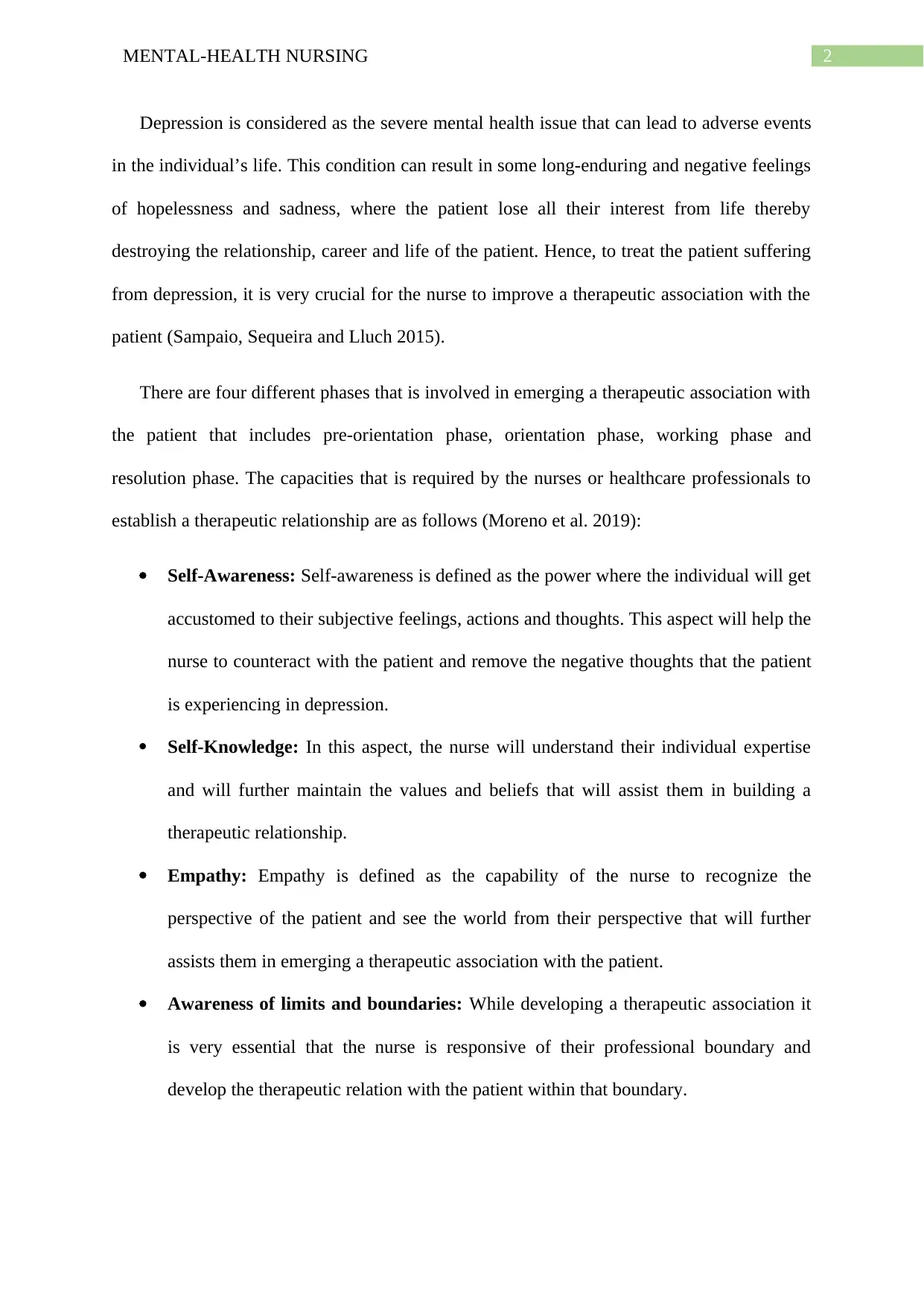
2MENTAL-HEALTH NURSING
Depression is considered as the severe mental health issue that can lead to adverse events
in the individual’s life. This condition can result in some long-enduring and negative feelings
of hopelessness and sadness, where the patient lose all their interest from life thereby
destroying the relationship, career and life of the patient. Hence, to treat the patient suffering
from depression, it is very crucial for the nurse to improve a therapeutic association with the
patient (Sampaio, Sequeira and Lluch 2015).
There are four different phases that is involved in emerging a therapeutic association with
the patient that includes pre-orientation phase, orientation phase, working phase and
resolution phase. The capacities that is required by the nurses or healthcare professionals to
establish a therapeutic relationship are as follows (Moreno et al. 2019):
Self-Awareness: Self-awareness is defined as the power where the individual will get
accustomed to their subjective feelings, actions and thoughts. This aspect will help the
nurse to counteract with the patient and remove the negative thoughts that the patient
is experiencing in depression.
Self-Knowledge: In this aspect, the nurse will understand their individual expertise
and will further maintain the values and beliefs that will assist them in building a
therapeutic relationship.
Empathy: Empathy is defined as the capability of the nurse to recognize the
perspective of the patient and see the world from their perspective that will further
assists them in emerging a therapeutic association with the patient.
Awareness of limits and boundaries: While developing a therapeutic association it
is very essential that the nurse is responsive of their professional boundary and
develop the therapeutic relation with the patient within that boundary.
Depression is considered as the severe mental health issue that can lead to adverse events
in the individual’s life. This condition can result in some long-enduring and negative feelings
of hopelessness and sadness, where the patient lose all their interest from life thereby
destroying the relationship, career and life of the patient. Hence, to treat the patient suffering
from depression, it is very crucial for the nurse to improve a therapeutic association with the
patient (Sampaio, Sequeira and Lluch 2015).
There are four different phases that is involved in emerging a therapeutic association with
the patient that includes pre-orientation phase, orientation phase, working phase and
resolution phase. The capacities that is required by the nurses or healthcare professionals to
establish a therapeutic relationship are as follows (Moreno et al. 2019):
Self-Awareness: Self-awareness is defined as the power where the individual will get
accustomed to their subjective feelings, actions and thoughts. This aspect will help the
nurse to counteract with the patient and remove the negative thoughts that the patient
is experiencing in depression.
Self-Knowledge: In this aspect, the nurse will understand their individual expertise
and will further maintain the values and beliefs that will assist them in building a
therapeutic relationship.
Empathy: Empathy is defined as the capability of the nurse to recognize the
perspective of the patient and see the world from their perspective that will further
assists them in emerging a therapeutic association with the patient.
Awareness of limits and boundaries: While developing a therapeutic association it
is very essential that the nurse is responsive of their professional boundary and
develop the therapeutic relation with the patient within that boundary.
⊘ This is a preview!⊘
Do you want full access?
Subscribe today to unlock all pages.

Trusted by 1+ million students worldwide
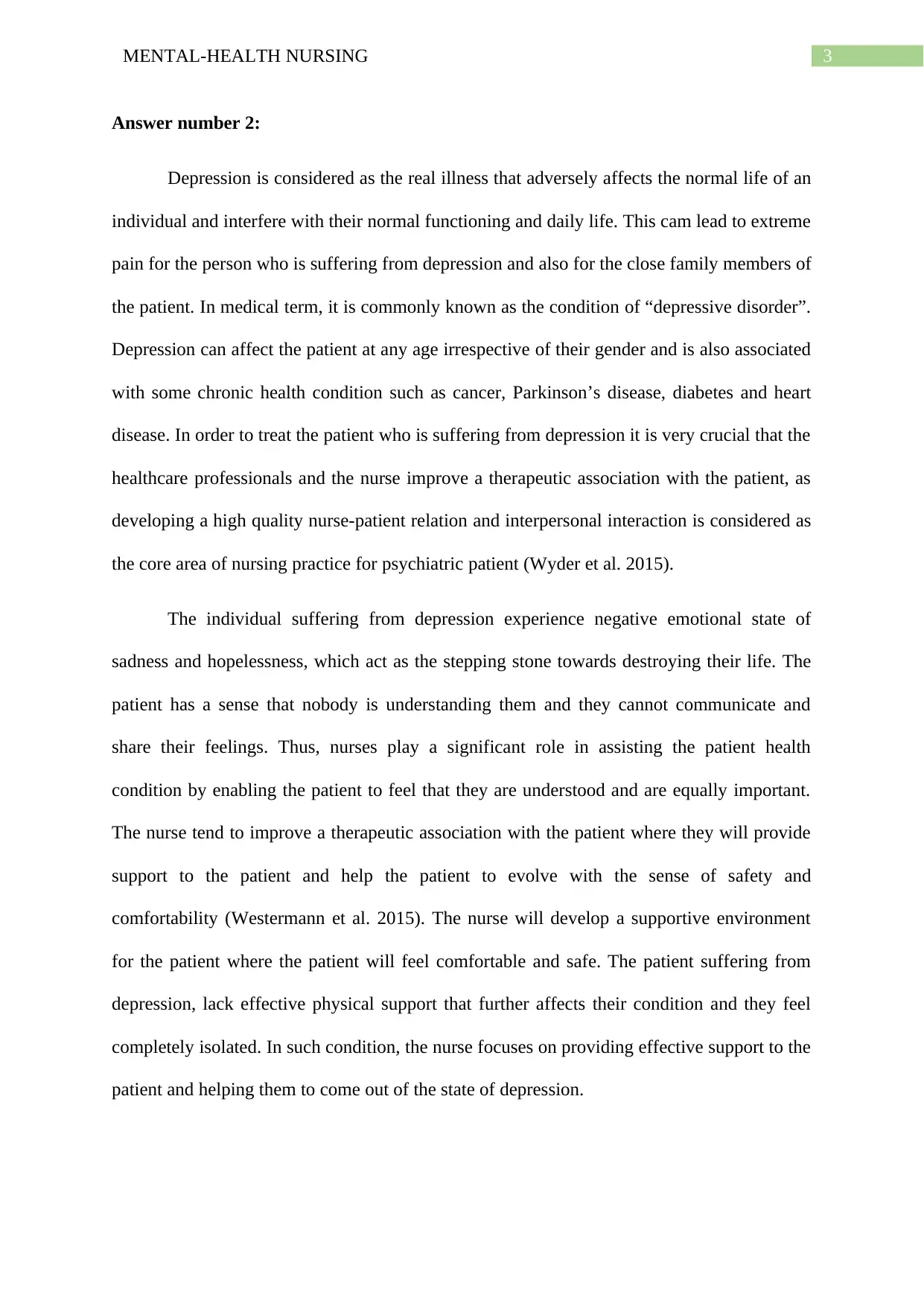
3MENTAL-HEALTH NURSING
Answer number 2:
Depression is considered as the real illness that adversely affects the normal life of an
individual and interfere with their normal functioning and daily life. This cam lead to extreme
pain for the person who is suffering from depression and also for the close family members of
the patient. In medical term, it is commonly known as the condition of “depressive disorder”.
Depression can affect the patient at any age irrespective of their gender and is also associated
with some chronic health condition such as cancer, Parkinson’s disease, diabetes and heart
disease. In order to treat the patient who is suffering from depression it is very crucial that the
healthcare professionals and the nurse improve a therapeutic association with the patient, as
developing a high quality nurse-patient relation and interpersonal interaction is considered as
the core area of nursing practice for psychiatric patient (Wyder et al. 2015).
The individual suffering from depression experience negative emotional state of
sadness and hopelessness, which act as the stepping stone towards destroying their life. The
patient has a sense that nobody is understanding them and they cannot communicate and
share their feelings. Thus, nurses play a significant role in assisting the patient health
condition by enabling the patient to feel that they are understood and are equally important.
The nurse tend to improve a therapeutic association with the patient where they will provide
support to the patient and help the patient to evolve with the sense of safety and
comfortability (Westermann et al. 2015). The nurse will develop a supportive environment
for the patient where the patient will feel comfortable and safe. The patient suffering from
depression, lack effective physical support that further affects their condition and they feel
completely isolated. In such condition, the nurse focuses on providing effective support to the
patient and helping them to come out of the state of depression.
Answer number 2:
Depression is considered as the real illness that adversely affects the normal life of an
individual and interfere with their normal functioning and daily life. This cam lead to extreme
pain for the person who is suffering from depression and also for the close family members of
the patient. In medical term, it is commonly known as the condition of “depressive disorder”.
Depression can affect the patient at any age irrespective of their gender and is also associated
with some chronic health condition such as cancer, Parkinson’s disease, diabetes and heart
disease. In order to treat the patient who is suffering from depression it is very crucial that the
healthcare professionals and the nurse improve a therapeutic association with the patient, as
developing a high quality nurse-patient relation and interpersonal interaction is considered as
the core area of nursing practice for psychiatric patient (Wyder et al. 2015).
The individual suffering from depression experience negative emotional state of
sadness and hopelessness, which act as the stepping stone towards destroying their life. The
patient has a sense that nobody is understanding them and they cannot communicate and
share their feelings. Thus, nurses play a significant role in assisting the patient health
condition by enabling the patient to feel that they are understood and are equally important.
The nurse tend to improve a therapeutic association with the patient where they will provide
support to the patient and help the patient to evolve with the sense of safety and
comfortability (Westermann et al. 2015). The nurse will develop a supportive environment
for the patient where the patient will feel comfortable and safe. The patient suffering from
depression, lack effective physical support that further affects their condition and they feel
completely isolated. In such condition, the nurse focuses on providing effective support to the
patient and helping them to come out of the state of depression.
Paraphrase This Document
Need a fresh take? Get an instant paraphrase of this document with our AI Paraphraser
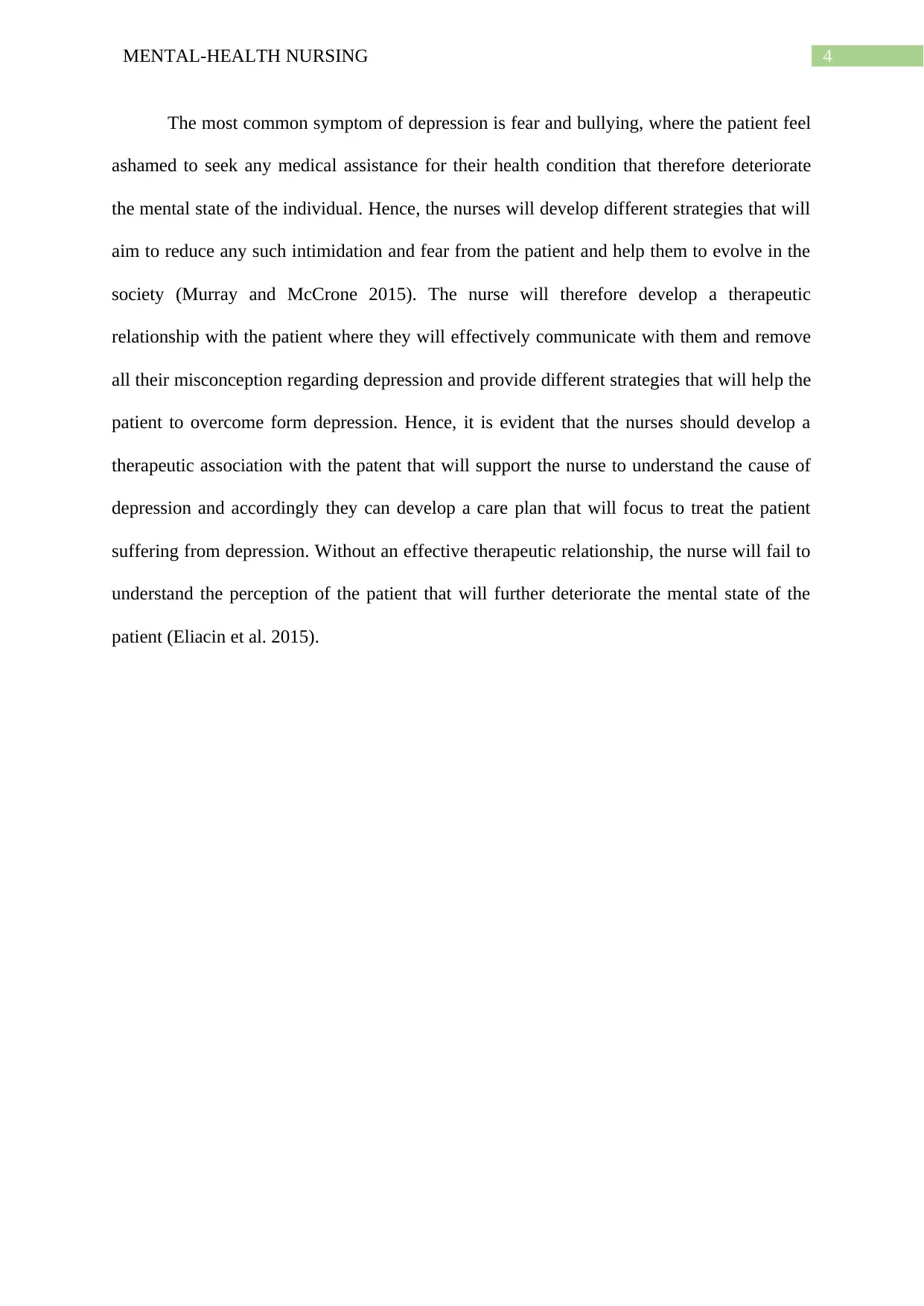
4MENTAL-HEALTH NURSING
The most common symptom of depression is fear and bullying, where the patient feel
ashamed to seek any medical assistance for their health condition that therefore deteriorate
the mental state of the individual. Hence, the nurses will develop different strategies that will
aim to reduce any such intimidation and fear from the patient and help them to evolve in the
society (Murray and McCrone 2015). The nurse will therefore develop a therapeutic
relationship with the patient where they will effectively communicate with them and remove
all their misconception regarding depression and provide different strategies that will help the
patient to overcome form depression. Hence, it is evident that the nurses should develop a
therapeutic association with the patent that will support the nurse to understand the cause of
depression and accordingly they can develop a care plan that will focus to treat the patient
suffering from depression. Without an effective therapeutic relationship, the nurse will fail to
understand the perception of the patient that will further deteriorate the mental state of the
patient (Eliacin et al. 2015).
The most common symptom of depression is fear and bullying, where the patient feel
ashamed to seek any medical assistance for their health condition that therefore deteriorate
the mental state of the individual. Hence, the nurses will develop different strategies that will
aim to reduce any such intimidation and fear from the patient and help them to evolve in the
society (Murray and McCrone 2015). The nurse will therefore develop a therapeutic
relationship with the patient where they will effectively communicate with them and remove
all their misconception regarding depression and provide different strategies that will help the
patient to overcome form depression. Hence, it is evident that the nurses should develop a
therapeutic association with the patent that will support the nurse to understand the cause of
depression and accordingly they can develop a care plan that will focus to treat the patient
suffering from depression. Without an effective therapeutic relationship, the nurse will fail to
understand the perception of the patient that will further deteriorate the mental state of the
patient (Eliacin et al. 2015).
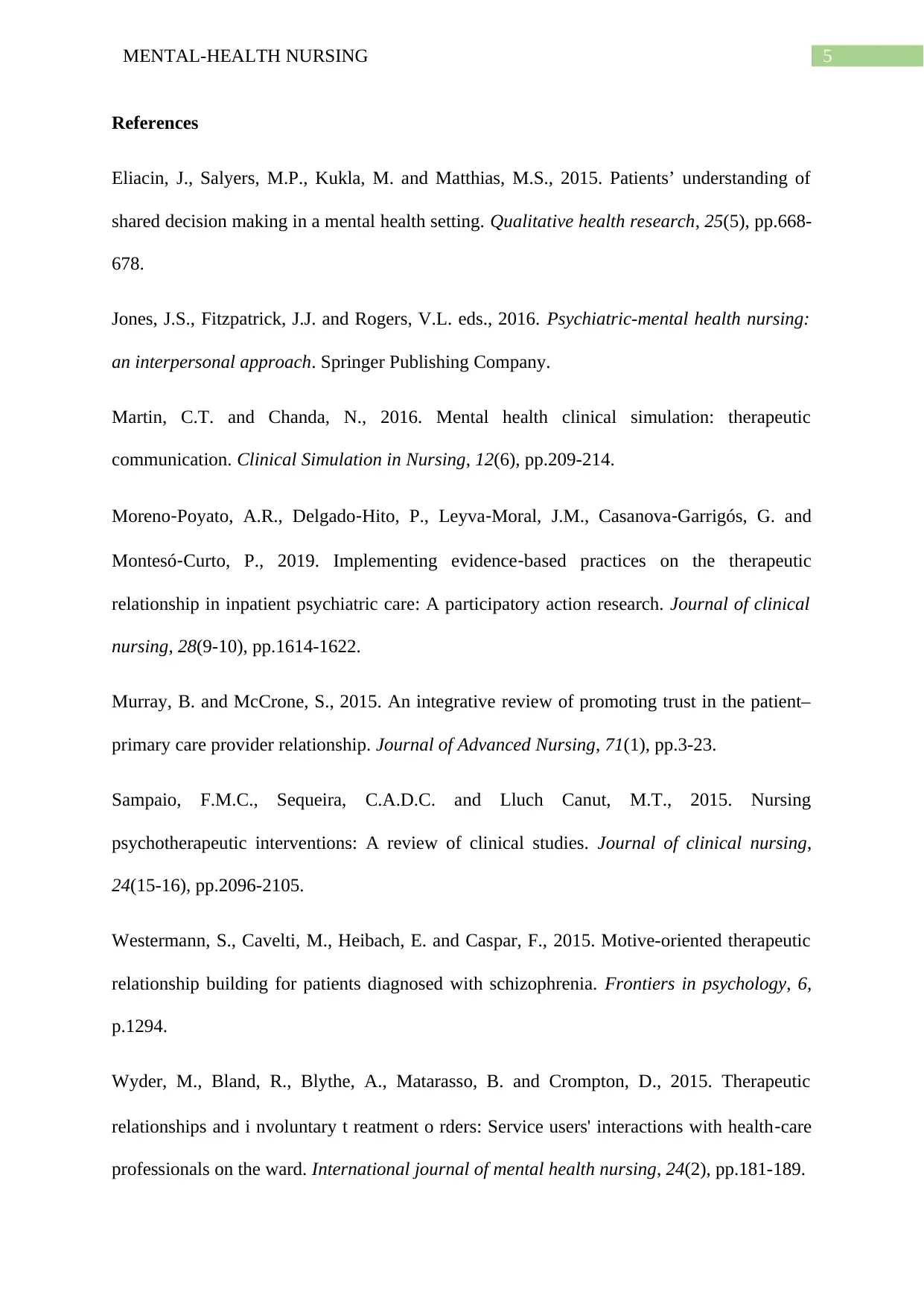
5MENTAL-HEALTH NURSING
References
Eliacin, J., Salyers, M.P., Kukla, M. and Matthias, M.S., 2015. Patients’ understanding of
shared decision making in a mental health setting. Qualitative health research, 25(5), pp.668-
678.
Jones, J.S., Fitzpatrick, J.J. and Rogers, V.L. eds., 2016. Psychiatric-mental health nursing:
an interpersonal approach. Springer Publishing Company.
Martin, C.T. and Chanda, N., 2016. Mental health clinical simulation: therapeutic
communication. Clinical Simulation in Nursing, 12(6), pp.209-214.
Moreno‐Poyato, A.R., Delgado‐Hito, P., Leyva‐Moral, J.M., Casanova‐Garrigós, G. and
Montesó‐Curto, P., 2019. Implementing evidence‐based practices on the therapeutic
relationship in inpatient psychiatric care: A participatory action research. Journal of clinical
nursing, 28(9-10), pp.1614-1622.
Murray, B. and McCrone, S., 2015. An integrative review of promoting trust in the patient–
primary care provider relationship. Journal of Advanced Nursing, 71(1), pp.3-23.
Sampaio, F.M.C., Sequeira, C.A.D.C. and Lluch Canut, M.T., 2015. Nursing
psychotherapeutic interventions: A review of clinical studies. Journal of clinical nursing,
24(15-16), pp.2096-2105.
Westermann, S., Cavelti, M., Heibach, E. and Caspar, F., 2015. Motive-oriented therapeutic
relationship building for patients diagnosed with schizophrenia. Frontiers in psychology, 6,
p.1294.
Wyder, M., Bland, R., Blythe, A., Matarasso, B. and Crompton, D., 2015. Therapeutic
relationships and i nvoluntary t reatment o rders: Service users' interactions with health‐care
professionals on the ward. International journal of mental health nursing, 24(2), pp.181-189.
References
Eliacin, J., Salyers, M.P., Kukla, M. and Matthias, M.S., 2015. Patients’ understanding of
shared decision making in a mental health setting. Qualitative health research, 25(5), pp.668-
678.
Jones, J.S., Fitzpatrick, J.J. and Rogers, V.L. eds., 2016. Psychiatric-mental health nursing:
an interpersonal approach. Springer Publishing Company.
Martin, C.T. and Chanda, N., 2016. Mental health clinical simulation: therapeutic
communication. Clinical Simulation in Nursing, 12(6), pp.209-214.
Moreno‐Poyato, A.R., Delgado‐Hito, P., Leyva‐Moral, J.M., Casanova‐Garrigós, G. and
Montesó‐Curto, P., 2019. Implementing evidence‐based practices on the therapeutic
relationship in inpatient psychiatric care: A participatory action research. Journal of clinical
nursing, 28(9-10), pp.1614-1622.
Murray, B. and McCrone, S., 2015. An integrative review of promoting trust in the patient–
primary care provider relationship. Journal of Advanced Nursing, 71(1), pp.3-23.
Sampaio, F.M.C., Sequeira, C.A.D.C. and Lluch Canut, M.T., 2015. Nursing
psychotherapeutic interventions: A review of clinical studies. Journal of clinical nursing,
24(15-16), pp.2096-2105.
Westermann, S., Cavelti, M., Heibach, E. and Caspar, F., 2015. Motive-oriented therapeutic
relationship building for patients diagnosed with schizophrenia. Frontiers in psychology, 6,
p.1294.
Wyder, M., Bland, R., Blythe, A., Matarasso, B. and Crompton, D., 2015. Therapeutic
relationships and i nvoluntary t reatment o rders: Service users' interactions with health‐care
professionals on the ward. International journal of mental health nursing, 24(2), pp.181-189.
⊘ This is a preview!⊘
Do you want full access?
Subscribe today to unlock all pages.

Trusted by 1+ million students worldwide
1 out of 6
Related Documents
Your All-in-One AI-Powered Toolkit for Academic Success.
+13062052269
info@desklib.com
Available 24*7 on WhatsApp / Email
![[object Object]](/_next/static/media/star-bottom.7253800d.svg)
Unlock your academic potential
Copyright © 2020–2025 A2Z Services. All Rights Reserved. Developed and managed by ZUCOL.





